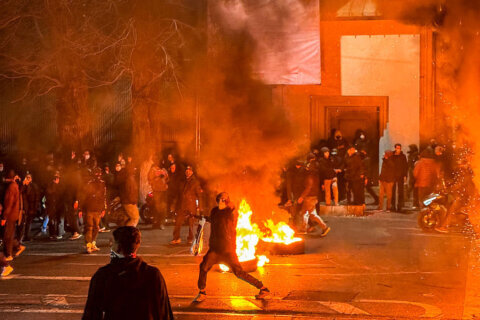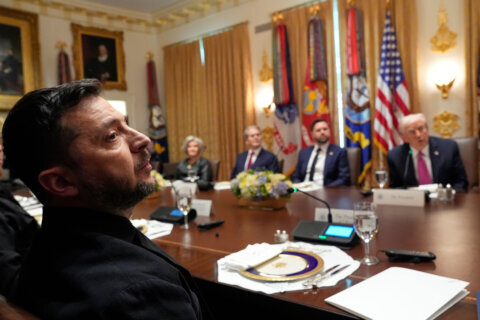Few world leaders gave Ukraine a chance to withstand Russia’s long planned invasion for more than a week. Ukrainians themselves were unsure. Russia’s top generals said it would be over in three days.
But now, nearly a year later, Ukraine has not only survived, but according to an advisor to Ukraine’s minister of defense, they’ve turned the tables.
“We became stronger, and we made our enemy weaker,” said Yuriy Sak, advisor to Ukraine’s minister of defense, who spoke to WTOP from Britain.
As the second year of the war begins, Kyiv is hopeful it will be the final year.
“We hope that this year will become the year of our victory. And we hope that this Feb. 24 will be the only ever anniversary of this unprovoked aggression against our country. We are confident that this is possible,” Sak said.
He is traveling the world like many other Ukrainian officials, trying to spread Kyiv’s message of self-assurance.
“We hope our allies share this confidence with us. And we hope that our allies understand that victory is possible this year,” Sak said.
The U.S. military, while steadfastly supporting Ukraine, has a slightly different view.
Joint Chiefs of Staff Chairman Gen. Mark Milley said in an interview published in the Financial Times, “It will be almost impossible for the Russians to achieve their political objectives by military means. It is unlikely that Russia is going to overrun Ukraine. It’s just not going to happen.”
But Milley added, “It is also very, very difficult for Ukraine this year to kick the Russians out of every inch of Russian-occupied Ukraine.”
He said it’s not impossible, “But it’s extraordinarily difficult. And it would require essentially the collapse of the Russian military.”
That, essentially, is Ukraine’s goal.
The heavy western-donated tanks that they will soon deploy and the fourth generation fighter jets they are lobbying the U.S. for are the key tools they need to try to make that happen.
Both countries have invested heavily in preparation for what military experts say could be a brutal spring offensive.
While Russia and Ukraine have hinted that the diplomatic door remains open, there appears to be little appetite for negotiations — on either side — to end the war.
Most of Ukraine’s neighbors and the European Union, which it hopes to someday join, have largely ceased calling for negotiations.
“I have difficulties imagining negotiations at this point,” a senior European Commission official told reporters on Feb. 17.
“It’s very difficult to imagine Putin going for anything less than his original objective. We don’t see any indications that the war aim is changing,” they said.
When it comes to Ukraine, the official said, upcoming elections make negotiations improbable because they would likely involve surrendering territory to Russia.
“For President Zelenskyy, it would be extremely difficult to find agreement anywhere among his population, after a very bloody war, to give out territories.”
Even though Russian forces have been embarrassed and outmaneuvered at every turn in the war, President Vladimir Putin made it clear in his state-of-the-nation speech on Feb. 21 that he’s not giving up on his original goal — “the demilitarizing and denazification of Ukraine.”
He has provided no proof that Ukraine’s leadership subscribes to Nazi tactics or ideology.
Putin’s speech came as U.S. President Joe Biden stealthy traveled into Kyiv on Feb. 20 after a secret 10-hour train ride. While there, he met with Ukrainian President Volodymyr Zelenskyy and expressed his support for Ukraine’s war efforts and amazement at the way they’ve performed.
“This is the largest land war in Europe in three quarters of a century, and you’re succeeding against all and every expectation, except your own. We have every confidence that you’re going to continue to prevail,” Biden said.
Before leaving, he also delivered another $500 million in military support for Ukraine.
On Feb. 21, with the Kremlin fuming after the visit and remarks, Putin announced that Moscow was withdrawing from the START 3 nuclear treaty, the last major Strategic Arms Reduction Treaty, that Russia shares with the U.S.
Hours later in Warsaw, Poland, Biden sent a clear message to the world during a rousing speech.
“There should be no doubt: Our support for Ukraine will not waver, NATO will not be divided, and we will not tire.”
The question that has no answer at this point, is how long that steadiness, unity and stamina must endure to bring an end to this war.
SIGN UP TODAY for J.J. Green’s new national security newsletter, “Inside the SCIF.” The weekly email delivers unique insight into the intelligence, national security, military, law enforcement and foreign policy communities.








